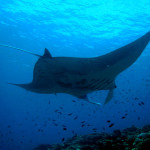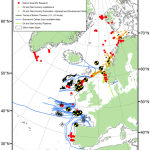You would think that deep-sea squid could hide from human pollution like dichlorodiphenyl- trichloroethane (DDT) and tributyltin (TBT), but these and other persistent organic pollutants (POPs) are accumulating in our cephalopod brethren, according to a new study about to be released in the journal Marine Pollution Bulletin by Michael Vecchione of NOAA Fisheries’ National Systematics Laboratory and colleagues Michael Unger, Ellen Harvey and George Vadas at the Virginia Institute of Marine Science of The College of William and Mary.
“The cephalopod species we analyzed span a wide range of sizes and represent an important component of the oceanic food web,” Vecchione said. “The fact that we detected a variety of pollutants in specimens collected from more than 3,000 feet deep is evidence that human-produced chemicals are reaching remote areas of the open ocean, accumulating in prey species, and therefore available to higher levels of marine life. Contamination of the deep-sea food web is happening, and it is a real concern.”






Ugh, that’s all i really can say.
Though there is this nifty article in the NY Times today: http://judson.blogs.nytimes.com/2008/06/10/meet-the-intraterrestrials/index.html